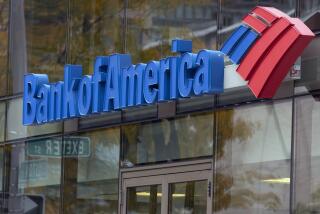Concerns About BofA Merger Raised at Hearing : Banking: Some fear service to low-income and minority customers will suffer despite the merged bank’s pledge of added loans for those clients.
- Share via
BankAmerica Corp. came under fire Tuesday from community groups and Los Angeles city officials who argued that the bank must guarantee basic banking and credit services in the city’s low-income areas as a trade-off for federal approval of its huge acquisition of Security Pacific Corp.
The forum was the first of four hearings to be held by Federal Reserve Board officials in the West to review the merger and whether the new bank will adequately meet federal guidelines that require banks to meet credit needs of minority and low-income customers.
San Francisco-based BankAmerica is seeking to acquire its Los Angeles rival in a stock swap valued at more than $4 billion, making it the biggest banking combination in history. Because the deal is so large, community groups and city officials fear that services to low-income and minority customers will suffer.
“The result can be a new banking giant with a credit and banking service market share so broad that it becomes unresponsive to some genuine needs,” Los Angeles City Councilman Mark Ridley-Thomas said during the hearing.
BankAmerica Chairman Richard M. Rosenberg defended the bank’s record at the hearing. He noted that BankAmerica’s pledge that the merged bank will provide $12 billion in loans largely to low-income and minority customers over 10 years is 33% higher than the combined goals of Security Pacific and BankAmerica now.
Despite the criticism voiced at the hearing, virtually no one expects the Fed to torpedo BankAmerica’s deal.
Fed officials, who have long touted big mergers as a way to improve the health of the banking industry, sent a signal that approval will be granted through the relatively easy approvals late last year of two other huge mergers: New York’s Manufacturers Hanover with Chemical Banking and Southeastern giant NCNB Corp. with C&S;/Sovran. In addition, Fed officials have been working with BankAmerica officials behind the scenes on regulatory issues since August, when the deal was announced.
Nonetheless, representatives of community groups believe that raising lending and service issues is important because the BankAmerica deal is so large that it will likely set a standard for how those issues are viewed in future bank mergers. If the issues are not treated seriously, they fear, the same will happen in future mergers.
Most groups have not come out in opposition to the merger but instead are listing issues they want addressed. Concerns at Tuesday’s hearing mainly centered on four basic issues affecting minority and low-income customers: the closing of neighborhood branches as the two banks combine operations, the availability of basic bank services such as check cashing, the availability of home loans in low- and moderate-income areas and the impact of the huge layoffs that are expected when the banks combine.
One specific action community groups would like BankAmerica to take is to expand low-fee check cashing services to give residents in such areas as South-Central Los Angeles an alternative to the high-fee check cashing businesses that have proliferated there. Check cashing fees can run from 10% to 15% of the amount of a check and have been known in some cases to exceed 20%.
In addition, Councilwoman Rita Walters argued that the bank needs to provide more property improvement loans to homeowners in South-Central Los Angeles. Because those loans have been scarce, she said, homeowners are falling prey to home-equity loan scams that can cost people their homes.
Mayor Tom Bradley was unable to attend the hearing because he is traveling, but in testimony submitted to the Fed he said he is troubled by data on home loans made by the two banks. Bradley said that in black middle-class areas, such a Baldwin Hills and Leimert Park, the two banks made 15 home loans in 1990, compared to 145 home loans in the San Fernando Valley area around Encino.
Rosenberg argued that low-income communities will benefit from the stronger combined bank. “We are absolutely confident that the merger will produce a bank that will bring new resources--financial and human--to meet community credit needs,” Rosenberg said.
In addition, Rosenberg and Executive Vice President Donald A. Mullane, who also spoke at the hearing, added that the bank is considering establishing branches in supermarkets in low-income areas to offset any impact from branch closings.
More to Read
Inside the business of entertainment
The Wide Shot brings you news, analysis and insights on everything from streaming wars to production — and what it all means for the future.
You may occasionally receive promotional content from the Los Angeles Times.










